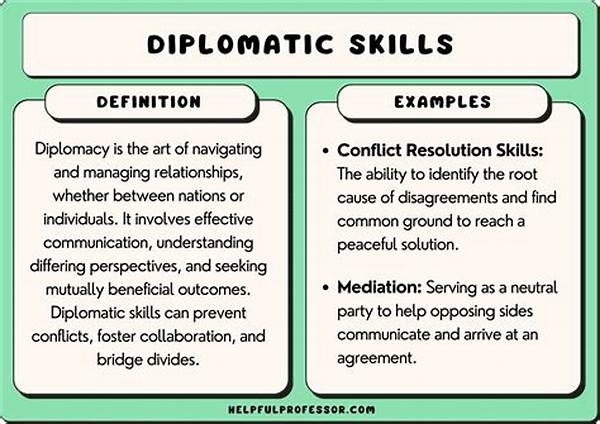The landscape of international relations has undergone significant transformation in recent decades. States navigate complex networks of interaction where power dynamics are continuously evolving. Underpinning these interactions is the quest to balance diplomatic strategies and sovereignty. It becomes crucial to delve into how nations maintain their sovereignty while actively engaging in global diplomacy, thereby shaping the modern world order.
Balancing Power: Diplomatic Strategies and Sovereignty
In the intricate web of global relations, balancing diplomatic strategies and sovereignty is of paramount importance. Sovereignty, the cornerstone of statehood, denotes not only a nation’s ultimate authority over its territory but also its retention of political and economic independence. Meanwhile, diplomatic strategies involve a nation’s ability to engage, negotiate, and collaborate on the global stage to further its own interests. For a nation, the intricate dance between sovereignty and diplomacy often manifests in the pursuit of foreign policy objectives, cooperation on international treaties, and participation in supranational organizations. Successful nations are those capable of leveraging their diplomatic strategies to safeguard their sovereignty while fostering an environment conducive to multilateral engagements.
Countries often face the dual challenge of pursuing national interests without undermining their sovereignty. Diplomatic strategies play a vital role in this context as they enable states to negotiate agreements that benefit their populations while upholding their autonomy. In this sense, diplomacy acts as both a shield and a tool—protecting sovereignty while enhancing a nation’s position in the global hierarchy. Globalization has further exacerbated this dynamic by compelling nations to find new strategies to maintain sovereignty amidst increasing international cooperation and interdependence. Therefore, understanding the intricate interplay between diplomatic strategies and sovereignty is essential to navigating the modern geopolitical landscape.
Implementation in International Affairs
Diplomatic strategies are not monolithic; they vary significantly depending on a nation’s goals. Each state adopts unique approaches to uphold its sovereignty while participating in the international system. Through careful negotiation and strategic alliances, states seek to promote national interests without ceding control over their sovereign affairs. This dynamic balance allows nations to pursue development on their terms while remaining integrated into the broader international community.
Economic partnerships form a critical component of diplomatic strategies and sovereignty. States often enter economic agreements that promise growth and investment while taking care to preserve sovereign decision-making within these frameworks. Trust and reciprocity become essential elements in ensuring that sovereign interests are prioritized in economic diplomacy.
Military alliances can also aid in upholding sovereignty while promoting regional stability. By participating in defense coalitions, states can access resources and safeguards that would be otherwise untenable independently. These alliances must be carefully managed to prevent any encroachment on national sovereignty and to ensure they align with a nation’s broader strategic goals.
Diplomatic strategies often involve multilateral negotiations within international forums. Here, the challenge lies in asserting sovereignty while engaging constructively in dialogue. Nations must adeptly navigate these discussions, reaffirming their independence while participating in cooperative agreements critical for addressing global challenges.
The use of soft power highlights another facet of diplomatic strategies that align with sovereign objectives. By projecting cultural influence and building networks of collaboration, nations can strengthen their global standing without compromising sovereignty. This approach underscores the strategic deployment of diplomacy to enhance a nation’s influence and reputation worldwide.
Challenges to Sovereignty
The intersection of diplomatic strategies and sovereignty is fraught with challenges, especially in the contemporary global environment. Technological advancements, economic interdependence, and transnational issues such as climate change pose significant challenges for states. They must negotiate agreements that benefit their populations while managing external influences on their internal affairs. Collaborative efforts in fields like cybersecurity, for example, require states to engage diplomatically while safeguarding national interests. Such issues necessitate a delicate balance to preserve sovereignty.
Global governance structures also impact the sovereignty-diplomacy dynamic, often requiring nations to conform to international norms and standards. In such arenas, states must negotiate treaties and participate in cooperative frameworks without encroaching on their independent authority. Moreover, rising nationalism and protectionism create obstacles in achieving a seamless integration of diplomatic strategies and sovereignty. States must navigate these ideological movements deftly to maintain sovereignty while advancing international cooperation. Consequently, the modern geopolitical landscape demands innovative diplomatic strategies to uphold sovereignty amidst an ever-evolving array of challenges.
Case Studies in Diplomatic Strategies and Sovereignty
Examining specific case studies provides valuable insights into how nations implement diplomatic strategies while safeguarding sovereignty. Switzerland, known for its neutral foreign policy, employs diplomatic strategies centered on multilateralism and peace promotion. By positioning itself as a mediator in international conflicts, Switzerland maintains sovereignty through its strategic use of diplomacy while contributing to global stability.
Similarly, Singapore leverages economic diplomacy to advance national interests while safeguarding its decision-making autonomy. By fostering strong economic ties with major powers, Singapore ensures sustainable growth while maintaining its sovereignty. These examples illustrate the effectiveness of nuanced diplomatic strategies in promoting sovereignty while remaining active participants in the international community.
Brazil offers another compelling example, using regional diplomacy to enhance sovereignty while playing a pivotal role in South American geopolitics. By advocating regional integration, Brazil secures its sovereignty through diplomatic leadership, ensuring its voice remains influential in regional policymaking. Such strategies highlight the significance of regional alliances in strengthening sovereignty through diplomacy.
Japan’s diplomatic strategies demonstrate another dimension of sovereignty preservation, focusing on technological and cultural outreach to maintain its influence globally. Through initiatives like cultural exchange programs and technological cooperation, Japan manages to balance diplomatic engagement with national autonomy, underscoring the multifaceted nature of diplomatic strategies today.
Lastly, the European Union illustrates the complexity of navigating sovereignty within supranational constructs. Member states actively participate in EU governance mechanisms while preserving national interests. This balance is achieved through continuous negotiation and adaptation of diplomatic strategies to align with shared goals while safeguarding sovereign powers.
Diplomatic Strategies and Sovereignty in the Modern Era
In today’s dynamic global arena, diplomatic strategies and sovereignty have become increasingly interdependent. The fluid geopolitical landscape demands agile diplomatic strategies that reinforce, rather than diminish, sovereign authority. This requires countries to innovate and adapt their diplomatic approaches to ensure autonomy while remaining active participants in international affairs.
Successful navigation of these complexities depends on a nation’s ability to assess and recalibrate its strategies in response to evolving global conditions. Given the diverse array of challenges and opportunities, including economic disruptions and international conflicts, states must plan strategically to safeguard sovereignty. This involves not only diplomatic acumen but also foresight in anticipating shifts in global power dynamics.
Conclusion: The Future of Diplomatic Strategies and Sovereignty
In conclusion, the intricate dance between diplomatic strategies and sovereignty is pivotal in shaping global relations. Understanding this interplay enables states to effectively pursue national goals while maintaining autonomy. Diplomatic strategies must be continuously recalibrated to respond to the changing international environment, balancing cooperation with the preservation of sovereign rights. As nations strive to navigate this complex landscape, the future of international relations will likely hinge on the ability to balance these two crucial elements—diplomatic strategies and sovereignty. In an era where global challenges demand collective action, striking a harmonious balance will remain a central pursuit for sovereign states worldwide.





